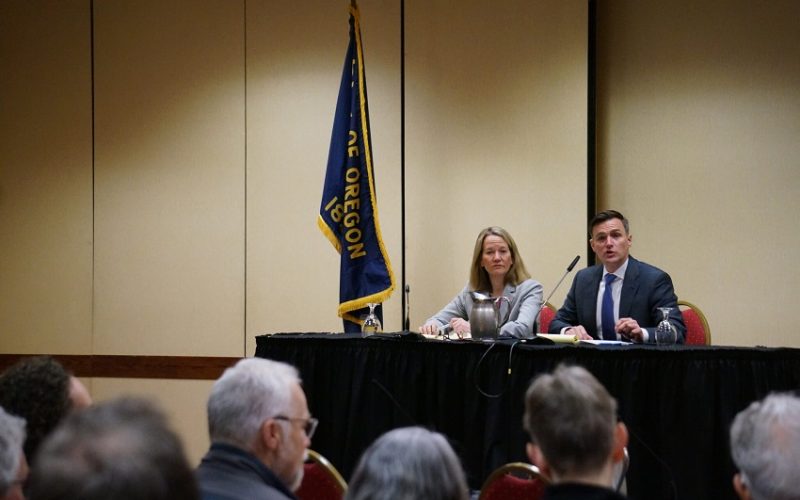Salem, OR – Oregon, along with 11 other states, has filed a lawsuit against former President Donald Trump and officials in his administration over a series of tariffs that have impacted a broad range of imported goods. The legal challenge, titled State of Oregon, et al., v. Trump, et al., was filed Wednesday in the Court of International Trade in New York. The case names Trump, U.S. Department of Homeland Security Secretary Kristi Noem, and U.S. Customs and Border Protection Commissioner Peter Flores as defendants.
The lawsuit, led by Oregon Attorney General Dan Rayfield, also includes the participation of attorneys general from Arizona, Colorado, Connecticut, Delaware, Illinois, Maine, Minnesota, Nevada, New Mexico, New York, and Vermont. The plaintiffs are challenging four executive orders issued by the Trump administration that imposed steep tariffs on goods imported from China, Canada, Mexico, and other countries. Specifically, the tariffs include a 145% tariff on many imports from China, a 25% tariff on goods from Canada and Mexico, and a 10% tariff on nearly all other foreign goods.
In addition to contesting the existing tariffs, the lawsuit also preemptively targets Trump’s proposed plan to raise tariffs on imports from more than 40 additional countries by July 9, 2025.
Attorney General Rayfield emphasized the adverse effects these tariffs have had on everyday Oregonians, particularly those living on fixed incomes. “When a president pushes an unlawful policy that drives up prices at the grocery store and spikes utility bills, we don’t have the luxury of standing by,” Rayfield said in a statement. “Especially when so many Oregonians live on fixed incomes.”
The core of the legal argument hinges on the use of the International Emergency Economic Powers Act (IEEPA), a 1977 law that grants the president broad authority to regulate foreign financial transactions during a national emergency. The plaintiffs argue that Trump’s use of the IEEPA to impose these tariffs was unlawful, as no legitimate national emergency exists to justify such sweeping economic measures. Furthermore, they contend that the U.S. Constitution grants the power to impose tariffs exclusively to Congress, not the Executive Branch.
Legal experts note that no president before Trump has used the IEEPA in this manner to impose tariffs. The plaintiffs argue that such an unprecedented move violates the separation of powers outlined in the Constitution.
The economic ramifications of these tariffs have been substantial, with experts estimating that the average U.S. household could see their cost of living increase by more than $3,800 annually due to higher prices on imported goods. Small and medium-sized businesses have been particularly hard hit, with many reporting struggles with the unpredictability and speed at which the tariffs have been imposed.
Oregon Governor Tina Kotek and U.S. Senator Ron Wyden have both held discussions with local business owners about the impact of the tariffs. During a roundtable held on April 16, business leaders expressed frustration with the tariffs’ inconsistency and rapid implementation. Emma Mcilroy, CEO of Portland-based clothing company Wildfang, warned that many smaller manufacturers could go under if the tariffs continue.
Oregon’s state economist, Carl Riccadonna, who participated in the roundtable, suggested that the full economic impact of the tariffs on Oregon might not become clear until mid-summer. However, he encouraged business owners to complete surveys to help Business Oregon collect data on the tariffs’ effects.
At a separate roundtable with businesses at the Port of Portland on April 23, Senator Wyden, who has been a vocal critic of the tariffs, announced plans to introduce legislation to end them. Wyden, along with Republican Senator Rand Paul of Kentucky, aims to put an end to the tariffs as soon as next week. Wyden described the issue as one of the most significant matters he has been involved with in his political career, stressing the high stakes of the ongoing tariff dispute.
As the legal challenge progresses, the ongoing discussions between state leaders, business owners, and lawmakers underscore the growing tension over trade policies and their effects on both local economies and consumers nationwide.











